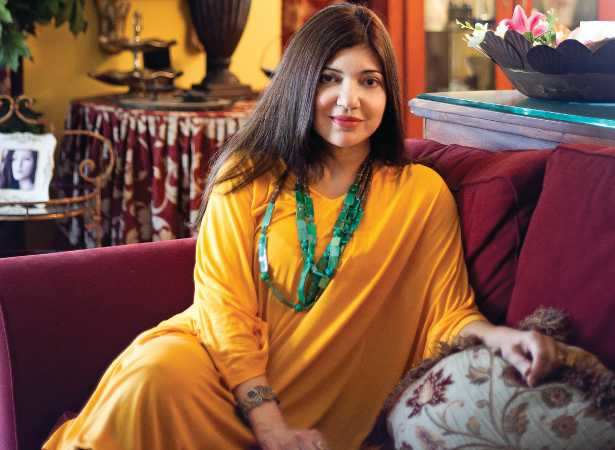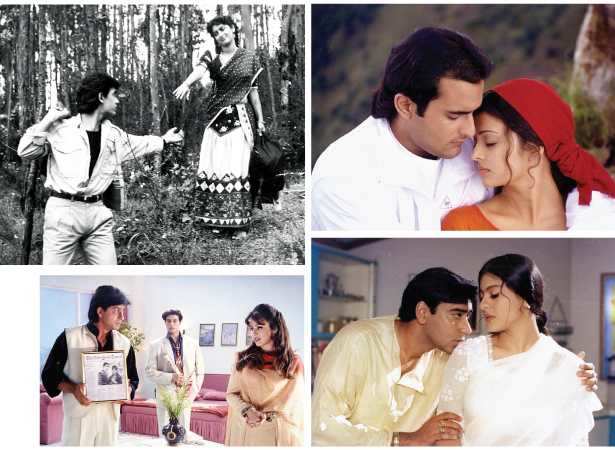Time has preserved Alka Yagnik. Much like her dulcet, distilled voice. Her slight frame and girlish demeanour bear no testimony to the three decades she has spent churning odes to love, loss and celebration. “I’m fond of clothes, dressing up and staying fit. In the ’90s, I was so busy recording four-five songs a day, there was no time for exercise. Today, I’m
doing a lot of concerts. Apart from hearing you, fans can also see you. It’s important to be well-groomed in the age of media glare,” she smiles.
She believes in keeping pace with the times. As someone who shot to limelight as Raakhee’s voice in Mere angnein mein (Laawaris) in 1981, she brought out Deepika Padukone’s angst as beautifully in Agar tum saath ho in the recent Tamasha. In fact, she even won the Filmfare nomination for the soulful melody last year. “I’m emotional about Filmfare. I won my first Filmfare Award for Ek do teen (Tezaab, 1988) a month after I had my daughter Sayesha,” she says recalling those halycon days. “Till date I’ve won seven Filmfare Awards. I hope to win many many more,” she smiles.
Lata Mangeskar, My Guru
She credits her father Dharmendra Shankar and mother and classical singer Shubha Yajnik (the original spelling of the surname) for having reached so far. “My parents were ambitious. Left to myself, I wouldn’t have come this far. I was laidback and dreamy,” says Alka who as a child sang on All India Radio in Kolkata. She traces her fascination for Lata Mangeshkar since then. “When girls played with dolls, I’d be stuck to the radio. I’d imitate Lata didi. I’ve learnt by just listening to her. She’s my guru. Didi is in me. Raina beeti jaaye (Parichay), Ajeeb dastan hai (Dil Apna Preet Parai) were my favourites,” she gushes. She recalls the time when she first met the legendary singer who she believed was a ‘fairy’ dwelling in a surreal world. “I met Didi for the first at Film Centre in Mumbai. She was recording Main tujhse milne aayee from Heera for Kalyanji-Anandji. I just gaped at her speechless.
She blessed me and said, ‘Padhai mat chodna!’ Though a bright student, I hated studies. But I went on to complete my studies.” Alka maintains that Lata can have no ‘successor’. “Her songs give me goose bumps. And mind you, in her days there was no technological enhancement,” she points out.
ROMANCE & RIVALRY
The late ’80s and ’90s saw a revival in romance where melody was king with the surge of musicians like Nadeem-Shravan, Jatin-Lalit, Anu Malik, Anand-Milind and others. She rates the time as her golden period too - when her tracks for Qayamat Se Qayamat Tak, Tezaab, Hum Hain Rahi Pyaar Ke, Saajan, Raja Hindustani among others went on to be superhits. “My voice suited romance,” she states. “I came in at a time when Lata didi and Ashaji (Bhosle) were ruling. Newcomers were not easily accepted. But I was fortunate to find my niche,” she claims. And there was no quest for survival either. “We were a well-to-do family. I was brought up like a princess,” she avers.
Struggle she may not have experienced but rivalry she definitely did. “Politics exists in every line of work. A lot of songs were taken away from me. One of my contemporaries played very dirty politics with me. Like I’d rehearse a song only to know that a senior singer had eventually sung it.” Never being the ‘over ambitious kind’, it didn’t leave her perturbed. “I’d say koi baat nahin. I didn’t bother who was doing what, saying what… I was a homebody and only too happy to return home after work.” Her competition, she says, was with herself. “I struggled with myself to get better. I sang from my heart. I was self-analytical, self critical… Even if today a song of mine is playing on radio, and I find something wrong with it, I ask the driver to switch the station,” she remarks humbly.
UNCONVENTIONAL MARRIAGE
One song she remembers being emotionally moved while recording was Babul ka ghar chhod ke from Daata (1989) composed by Kalyanji-Anandji. “I was about to get married. And while singing this song with Kishoreda, I almost choked!” she recalls. The conversation veers to her long-distance marriage with Shillong-based Neeraj Kapoor, distributor of Mohan Meakin Breweries in the North-East. “Our marriage can be summed up in the U2 song Can’t live with or without you. It’s been a difficult marriage to hold on to. But we couldn’t let go of each other,” she confides adding, “So far, we’ve survived the negatives of staying apart. It was tough to keep the marriage going though we meet off and on.” She views her unconventional marriage with humour. “People say you’re on a constant honeymoon. But it’s not like that. If you don’t live together, you don’t grow together. Somewhere, the communication gap creeps in. But we’ve stuck together because there’s a strong basic bond. Joh chhute nahin chuthta. In between, we had separated for about four-five years but we got back,” she clears the air. She credits her husband for understanding the demands of her profession.
She doesn’t deny that attractions do happen. “After all we sing songs of mausam, mohabbat...,” she laughs. “I’ll not lie and say that I’ve never got attracted to people. But
I didn’t get carried away. My values are strong. I also believe one’s dignity lies in one’s hands. I don’t believe in frivolous behaviour.
I believe in the sanctity of marriage. I’m a bit of an idealist.” She was firm about drawing the lines in an industry where stories of the casting couch abound. “Nobody had the audacity to act fresh with me. My body language says ‘don’t mess with me’. I won’t say nobody tried to misbehave with me. But they could not, barring one or two unpleasant instances. I laid down the rules. I was never glamour struck,” she asserts.
MUSIC TODAY
Coming to the current music scenario she rues the fact that singers today have a short shelf-life. “There’s an influx of singers. There’s no dearth of talent. Supply is more than the demand. So it’s difficult to carve your identity. Also, the intrinsic value of a song has diminished. You listen to it, you dance on it, you forget it... just like fast food!” She’s also aware of the trend where six to seven singers are made to sing one particular song out of which one version is retained. “What does this trial and error mean?” she retorts adding that she’d never comply with such a scenario. She doesn’t quite take to the fact that technology can tune a ‘besura’ voice. “It can even change the tonal quality. That’s why sub-standard singers can get away with playback singing. But on stage there’s no second chance. You’re heard as you are,” she cautions.
She enjoys doing concerts. “The audience euphoria, energy… charges you, then it’s just my song, my audience and myself. I’m shy but I become a different person on stage. Surprisingly, the audience demands the songs I sang in the ’80s and ’90s,” she points out.
It’s been a full-throttled life. But she does concede to feeling lonely at times. “Basically, I’m a loner. It’s not difficult to be with myself. I hear music, read and watch films. I like spending time with my daughter Sayesha who’s launched her restaurant - Boveda Bistro – in Andheri. My husband flies down to spend time with us sometimes.” She seems to have aced the balancing act with the years. She winks and says, “Kaam bhi karti hoon, zindagi bhi jee rahin hoon. I never did the wild things as a teenager. Movies, parties... Maybe, I love to do the wild things now.”
Alka Shares the memories behind the music...
Ek do teen (Tezaab, 1988)
It was a well-written number counting the days of the month. The lyrics (Javed Akhtar) and tunes (Laxmikant-Pyarelal) were hand in glove. It was an ‘item’ song of substance. Madhuri Dixit’s dance was the highlight.
Gazab ka hai din (Qayamat Se Qayamat Tak, 1988)
We were a new team – director Mansoor Khan, composers Anand-Milind, actors Aamir Khan and Juhi Chawla and singers Udit Narayan and I. We were all trying to prove a point. Only Majrooh saab (Sultanpuri) was a veteran.
Pardes (1997)
In the song Meri mehbooba, I just had to sing an antara of four lines… Bhala kaun hai woh... and it won me the Filmfare Award.
Kuch kuch hota hai (Kuch Kuch Hota Hai, 1998)
The song on paper seemed a bit funny but when we sang it, we knew it was a winner. Karan Johar, though so young then, had a sharp music sense, he understood every harkat.
Pyaar ke liye chaar pal kam nahin the (Dil Kya Kare, 1999)
The Jatin-Lalit score is symbolic of my life with my husband Neeraj. We were never together. My husband has only one grudge against my music. “It’s kept you way from me,” he says.
Taal (2000)
We flew to Chennai on short notice as AR Rahman was to fly overseas. He came around 2.30 am. Subhashji (Ghai) and I were almost falling asleep outside the studio. But when we began recording it, we forgot everything else.
Aisa lagta hai (Refugee, 2000)
Anu Malik’s score is lilting. It was Kareena Kapoor’s debut and her chubby innocence was endearing.
FILMFARE AWARDS FOR BEST PLAYBACK (FEMALE)
Ek do teen - Tezaab (1988)
Choli ke peeche - Khal-Nayak (1993)
Meri mehbooba - Pardes (1997)
Taal se taal mila - Taal (1999)
Dil ne yeh kaha hai dil se - Dhadkan (2000)
O re chhori - Lagaan (2001)
Hum Tum - HUM TUM (2004)

